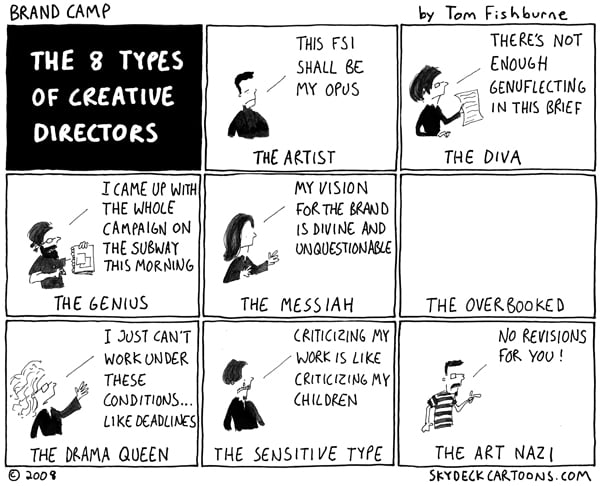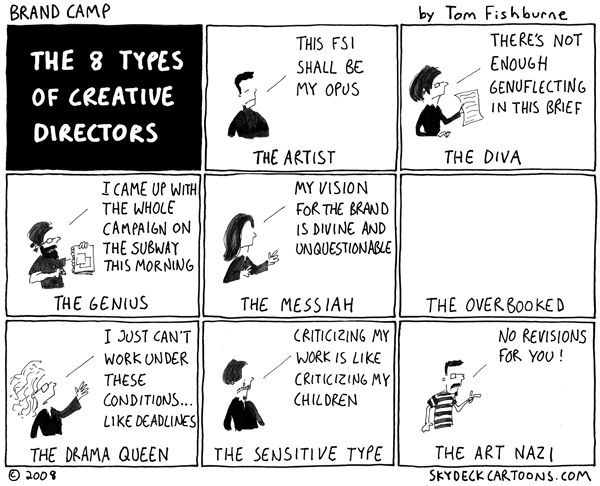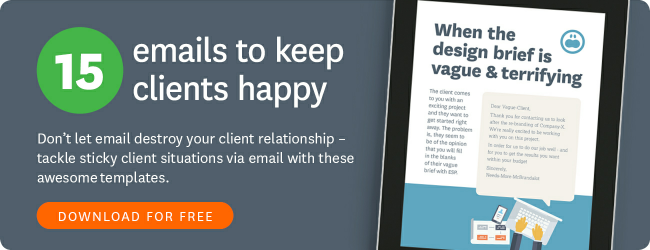There comes a point in every freelancer's career where you hit a growth wall. You've built a solid client roster that has you working 40+ hours a week and bringing home enough money to pay the bills. You've raised your rates steadily over the last couple of years, but are now at a level where you can't justify raising them significantly again – clients will simply only pay so much for the type of work you do.
Many freelancers are happy to stay at this level for the rest of their career, perhaps adding passive income streams such as stock images or info-products for additional income. But others are more ambitious, and want to continue to grow. And as a freelancer, the one of the few options available to you is to move to an agency model.

Cartoon: Tom Fishburne.
As an agency, you are able to work on more projects for more clients – and you're able to focus on the types of projects you love. You perform less of the "grunt work" yourself, and focus more on sourcing and retaining clients, managing the business and making sure your team is running smoothly. If you enjoy this process, you could find running an agency a great alternative to freelancing.
But running an agency isn't something you should jump into without first doing your research. In this article we'll look at some of the things you'll need to consider and steps you'll have to take before you open your doors as a new creative agency.
Change Your Mindset
Do you even want to run an agency? That's the key question you need to ascertain before you begin the transition to an agency model. Not all freelancers are cut out for running their own agency, nor is the work something all freelancers will enjoy.
By pulling together a team of creative you're able to capitalise on their strengths and experiences – and tackle projects that were once well outside your own capabilities. It's an exciting prospect, but one that might not be right for all freelancers.
An agency makes its name by taking on a lot of similar types of projects, so you'll probably find you'll need to specialise in a particular type or style of project. As you'll be working with a team, you'll no longer be carrying each project through from conception to sign-off – instead, you'll be tackling only a small part of that process. For some freelancers, this can seem boring and repetitive – for others, it's a whole new type of creative challenge.
As the director of an agency, you'll have to learn many new skills. Your focus will shift from the execution of briefs to strategy and management. You will often be prioritizing administration over the more creative work. If you prefer to sit in the background, you will probably not enjoy running an agency.
Communication skills are also vital for a successful agency. If you already struggle with client communication and can't seem to get a handle on your inbox, you will probably struggle with the increasing demands of agency communications. Not only are you dealing with a considerably larger pool of clients, but you're also managing a team that will require accurate and effective communication to avoid delays and bottlenecks.
Are you ready?
Start with a Small Test Run
Many freelancers struggle with the concept of delegating work – and therefore, creative control – to other members of a team. Before you delve headlong into creating an agency, test the waters to see if it works for you by working on a couple of projects with a "team".
You could begin by subcontracting out some of your work to other freelancers. You might look for interested designers, developers and writers who are finishing up their studies and looking for experience. It's a win-win, they learn the ropes on an actual, paid job for a real client and you get to see what it's like handing off a job to a staff member.
Depending on what jobs you need doing; you could also look at subcontracting a virtual assistant to undertake some of your admin or marketing jobs.
By starting with sub-contractors, you learn how to delegate different tasks on a job and dealing with someone else's style and approach to a brief. You can learn the weak points in your processes and communication strategy early on.
Many agencies begin in this way, with subcontractors working on more and more projects, and the owner refining the processes and skillset, until it's time to change the name on the door.
Brand New, Brand Big
You've been working hard over the years to perfect the branding of your freelance business. You have established yourself with a particular reputation, with a logo, website, blog, and marketing materials that appeal to your ideal clients.
Now it's time to scrap all that, and start again.
An agency's branding will be very different from a freelancer's. The types of jobs handled by an agency will be very different to the clients you're used to as a freelancer. Instead of branding a person (you), you are branding a business.
When creating the branding for your agency, it's vital you have a clear idea of the type of client you want to acquire, as well as the future direction of the agency. What are your long-term goals? Remember that the brand doesn't just only have to fit the company you're creating now, but also the company you will expand into in coming years.
One of the most significant advantages of an agency over a freelance business is that you can sell an agency to a willing buyer. It's difficult to sell a freelance business because you're trading under your own name. When creating the branding for your agency, think about how to make your brand as appealing to potential future buyers.
Get Your Books in Order
As a freelancer, you're able to shuffle along as a sole trader using an Excel spreadsheet, a shoebox filled with receipts and an invoice made in MS Word. As an agency dealing with numerous jobs, this system is no longer going to cut it.
First you'll need to talk to an accountant about your record-keeping and tax obligations. You'll need to register as a company and figure out your business structure. You'll also need to figure out how you're going to package your services, what your rates will be and how you will quote and charge for work.
Then, you'll need to suss out an accounting and bookkeeping system. You basically have two options – a cloud-based system, or a software package. For this, I recommend Xero Accounting, as the system is in the cloud, you pay a small subscription fee each month, and it offers a range of features that can easily grow and adapt with your business.
Next, you'll need to establish systems for managing workflow and timesheets. How will you break up a project into various stages and divvy out the stages to members of your team? What policies and processes do you need to create to help things run smoothly? What information does each team member need in order to carry out their jobs?
If you're charging a job according to the time it takes to complete, then you'll need a system for time-tracking. Time tracking isn't just vital for accurately charging jobs – it enables your agency to collect quantifiable data about your processes and productivity.
Accurate time tracking is always an issue for agencies. Many creative are resistant to time tracking, as it breaks their creative flow. It's often left up to each team member to track their time, and the variety of different methods means that data is both inaccurate and difficult to obtain.
The Workflow Max time-tracking system solves this issue, by providing a simple interface for your agency to track time. Workflow Max can be integrated with Xero Accounting for a truly streamlined administration system. And thanks to the new Adobe Time Tracking Extension, your team can now track time from within the Adobe Creative Suite.
Recruit the Best Team
An agency is only as strong as its weakest member, so it's important to ensure you recruit a strong team. First of all, figure out exactly who you need. An agency might need someone to perform the following roles:
- HR and administration.
- Marketing.
- Creative Director
- Finance and Payroll
- Creative Team: designers, developers, copywriters, pre-and-post-production.
If you've been subcontracting or outsourcing to a Virtual Assistant for some time, you probably have some of your team already established. Choose people with a strong portfolio, skills in areas that compliment your own, and whose work ethic and reputation command respect. It's best not to work with people who are your friends in real life, as you can quickly run into problems that spill over into your personal life.
Once you've sourced your team, you'll need to establish a formal relationship with them through a contract or working agreement. You'll also need to decide how you're going to pay your team, and how you're going to structure their work. Are you going to have them work as contractors, or will you take them on as employees?
There are advantages and disadvantages to both:
- With employees, you're required to cover holiday leave, sick leave, Kiwisaver and other retirement accounts, and other benefits.
- However, with contractors, you'll usually pay a significantly higher hourly rate than an employee.
- Sods Law dictates that when you desperately need them to complete urgent work, all your contractors will be either on holiday or in hospital.
- You're required to pay employees for the hours specified in their contract, even if you have no work for them to do.
Once you've chosen your structure and got your team in place, you'll have to work with them closely to ensure you're delivering the best work to your clients. Communication skills are vital – here are some quick tips on managing a creative team:
- Pay consistently and on time, every time. Keep cash in reserve to ensure your team get paid for the work they do.
- Create a fun and supportive work environment. Even if your team freelance from home and you never meet face to face, take the time to check in with them and make sure they're happy. Make it clear you're open to any communication and ideas to make processes better.
- Establish consistency: freelancers love stability – giving your team a steady stream of challenging, interesting work will foster loyalty and respect.
- Keep on top of workflow. Know who has what on their desk and where each project is at any one time.
Review Your Contracts
Whether you're an agency or freelancer, it's vital that you have contracts in place that protect you, your team and your clients in the event of legal disputes.
Often, freelancers are dealing with "the little guys" in the business world, which means that wishy-washy contracts can go undetected and unchallenged for years. As an agency operating as an LLC or other company structure, you can't afford for this to happen.
Here are some of the issues your agency contract will need to cover:
- Who owns the rights to the work and what rights are signed over? Does the client have the right to make changes to your work after signing it off, or can they add a design to a commercial product and sell it for profit?
- What is the payment schedule and what happens if the client doesn't pay?
- What happens if two or more people give feedback on edits to their project, and they cannot agree? Who should your agency report to within the client's company?
- Under what terms can you, or the client, cancel the project?
- How many rounds of revisions or edits are included in the quoted price?
- If you give advice to a client and the client follows your advice and it ends up losing him/her a lot of money, are you protected against that client taking you to court for damages?
A lawyer specialising in business law will be able to talk you through the wording of your contract and explain the necessary clauses to protect your company.
Seek Out Advisors
The work that goes into establishing your agency can seem overwhelming – there are so many decisions you need to make and it can be difficult to decide what will be right for your company. It is an exciting time, but can also be terrifying – one mistake can destroy your agency before you've even opened the doors.
Often, a freelancer has little to no business education – you're a creative soul to begin with, and what you know about business you learned on the fly as you needed it. When running an agency, you can't afford to take this approach. Instead, seek out experts to help you learn and make the right decisions.
Your first stop should be the library. Check out books on business management and establishing an agency. Learn from the experts in your field what worked for them, and what didn't.
Find a lawyer and accountant who you feel comfortable with – they will be your first line of defence when it comes to your business. Before meeting with your accountant or lawyer, jot down a list of questions you need to ask them so you don't forget. The best way to find a good lawyer or accountant is to talk to other business owners and get recommendations.
You should also strongly consider finding at least one mentor – a fellow business owner (ideally, a creative agency director) who has a few years of experience under his/her belt and can offer vital advice and inspiration. Being able to sit down with your mentor and pick his/her brain about what works and why will offer invaluable insights.
There are many organisations that specialise in pairing business owners with appropriate mentors. You could contact Business Mentors NZ, the Maori Business Facilitation Service, or your local Chamber of Commerce chapter about finding a local business owner willing to be a mentor.
Alternatively, you can approach business owners directly. Most directors have "been in the trenches" before and are happy to help a young agency starting out. Since the mentor will be giving up his/her time to help you out, be sure to offer something in return to express your gratitude, even if it's just a free lunch every month or a bottle of wine.
Target the Right Clients
Once your agency is established and you have your team and your processes in place, you'll need to start the never-ending hunt to acquire new clients. As an established freelancer, you already have a pool of previous clients you can draw on, but don't be surprised if many of these clients are no longer interested in working with you.
Clients have many reasons for approaching a freelancer, and they might not be comfortable working with an agency. You should be prepared to meet resistance to your new model, even from your most loyal clients. If this happens, you need to be ready with a list of advantages of using your agency over a solo freelancer.
Larger companies with bigger budgets are more likely to respond to the agency model. They're also more likely to accept a higher hourly rate – which you'll need to cover your overheads. Look at the portfolios of similar sized agencies in your area – figure out the types of clients they're landing. How can you find similar clients?
You may have to employ new marketing techniques you've never used before, such as tendering for work or joining professional networking organisations. Your mentor should be able to advise you on other strategies and techniques they have found useful.
As you can tell, starting an agency when you've been working as a freelancer is a whole different set of skills and business practices. Not only will you be tackling creative projects for your clients, but you'll be managing staff and workflow, overseeing the day-to-day running and the bigger picture business planning, and being a brand ambassador for your agency.
Many freelancers would feel daunted, and rightly so. In many ways traditional freelancing is easier than running an agency. But it can also be lonely, and limiting. If you're keen to give the agency model a go, you may just find it's the perfect model for your business and creative endeavours.
As a freelancer, did you, or would you ever consider, starting a creative agency? What are your top tips for succeeding in the agency world?







